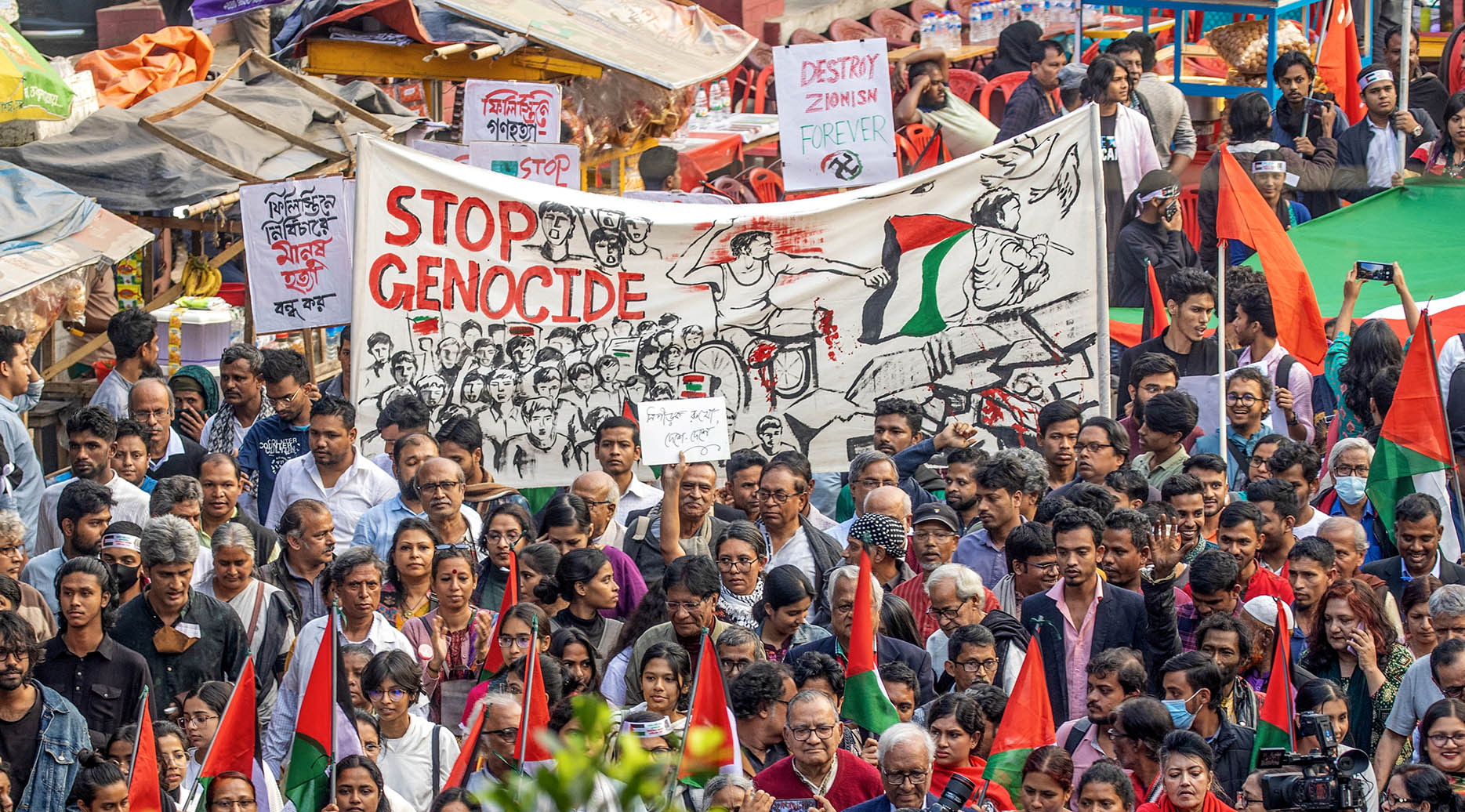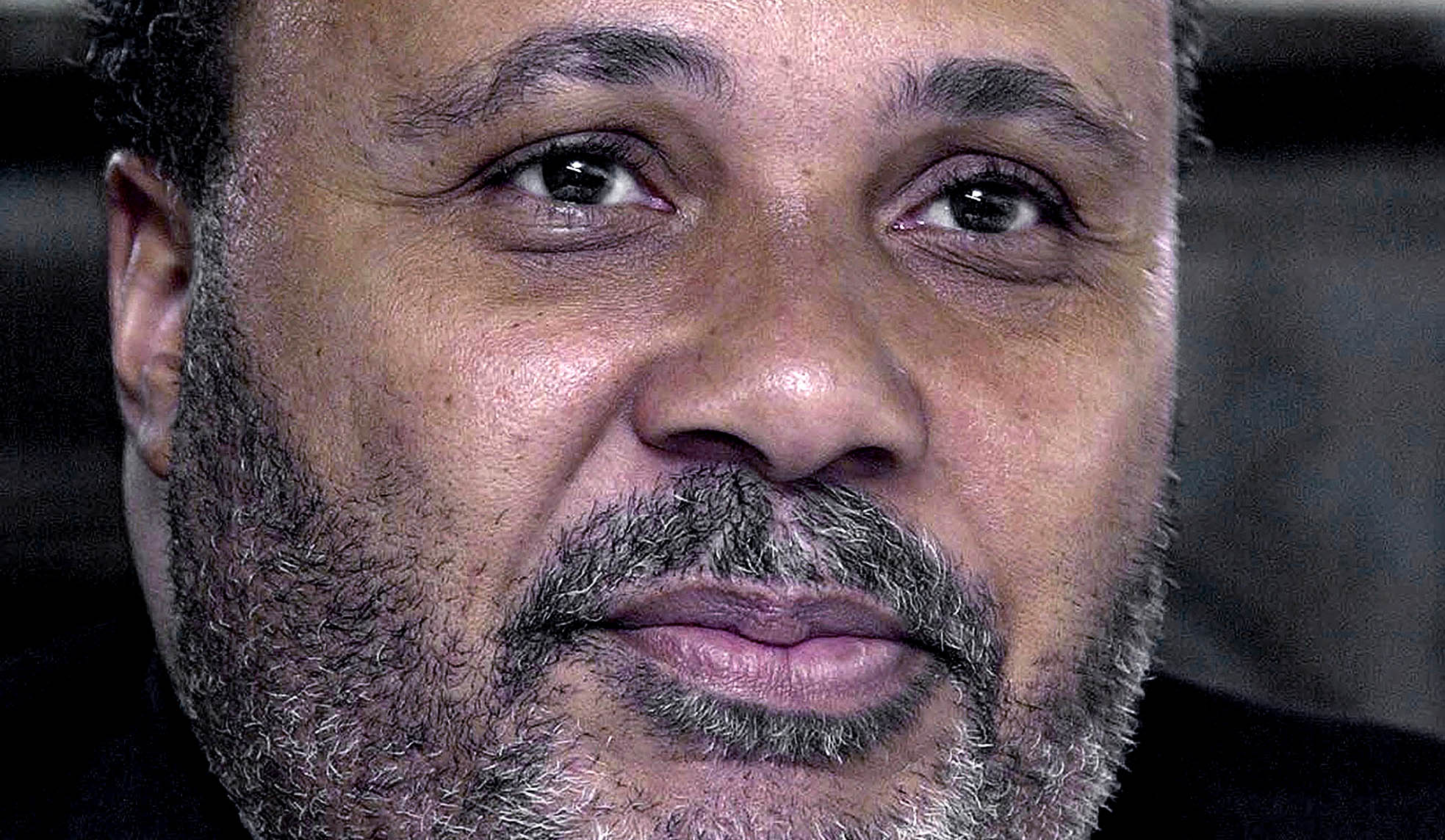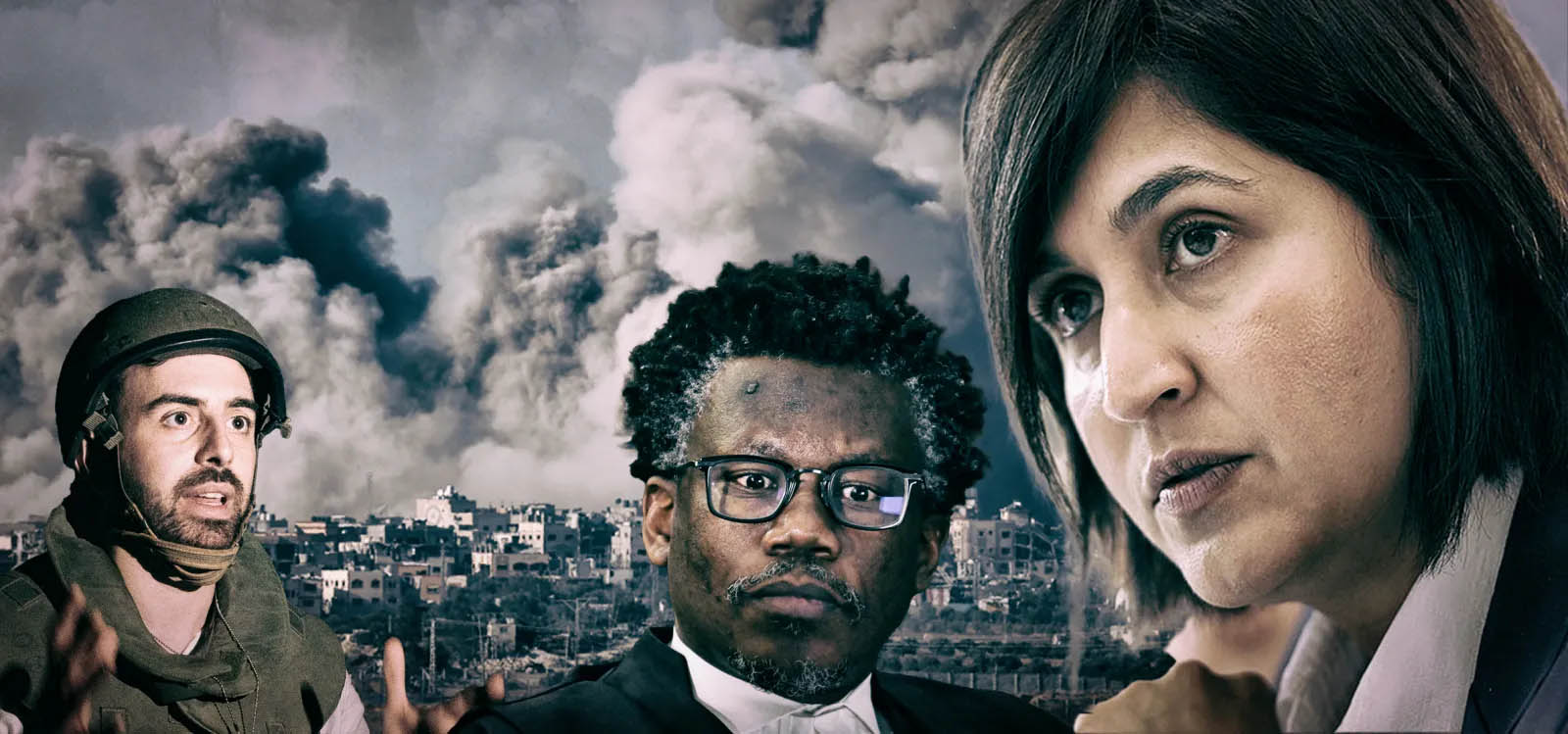‘The world won’t get no better if we just let it be. The world won’t get no better, we gotta change it, just you and me,” sang Harold Melvin and The Blue Notes in their popular song Wake Up Everybody in 1976. This song came at a time when there was global turmoil around racial and socioeconomic tensions in the US and more specifically in South Africa, as the struggle for equal rights and an end to an unjust and violent political system raged. It became a rousing call for international solidarity and unity, a call to humanitarianism.
Last week, South Africa set an inspiring tone of international solidarity around human rights, displaying a wealth of legal excellence mobilised towards the righteous cause of the protection of the life and dignity of the Palestinian people at the International Court of Justice (ICJ). Their submissions on Israel’s intent to commit genocide against the Palestinian people, using the Genocide Convention, served not only to spotlight the injustice currently being perpetrated, but was also an act of solidarity with the Palestinian people, underscoring that the world could not be silent in the face of their demise.
Read more in Daily Maverick: Top SA legal team argues genocidal intent by Israel showing how life is being squeezed from Gaza
It bears reflection that the creation of the ICJ was necessitated by the need for a means of a settlement of disputes between states, and emanates from article 33 of the United Nations Charter. This means that all states that are signatories to the United Nations are subject to the court. The Genocide Convention is one of the treaties that was adopted by the UN, the signatories to which (South Africa and Israel are among them) are committed to ensuring that acts of genocide never happen again.
 Palestine Solidarity Committee members at a mass rally in support of the Palestinian people in Dhaka, Bangladesh, on 29 December 2023, in a call to 'stop genocide', 'end occupation' and 'free Palestine'. (Photo: EPA-EFE / Monirul Alam)
Palestine Solidarity Committee members at a mass rally in support of the Palestinian people in Dhaka, Bangladesh, on 29 December 2023, in a call to 'stop genocide', 'end occupation' and 'free Palestine'. (Photo: EPA-EFE / Monirul Alam)
So, the question of South Africa’s interest in the matter between Israel and Palestine is one of duty as per the convention but also one of rectitude in the pursuit of the protection of human rights. With no one else coming to their defence, what would become of them? South Africa’s founding principles of Ubuntu also compel us to adopt the position we have, particularly having gone through gross human rights violations of our own.
The UN’s Universal Declaration of Human Rights states: “Human rights are universal and inalienable. All people everywhere in the world are entitled to them.” And this is what UN secretary-general António Guterres was guided by when he said: “Nothing can justify the collective punishment of the Palestinian people. The humanitarian situation in Gaza is beyond words. Nowhere and no one is safe.”
What has been interesting is seeing which countries have chosen to be detractors of South Africa’s ICJ case and which are in support of its bid for the protection of Palestians’ human rights. The US and Germany have been the most vocal in condemning and dismissing South Africa’s case as “meritless, counterproductive and completely without any basis in fact whatsoever”.
When the majority of South African people faced human rights violations under apartheid, the world rallied behind us... It’s now our turn to return the favour.
Germany, whose history includes first perpetrating genocide against Namibia’s indigenous Herero and Nama peoples between 1904 and 1908 and then Jewish people in Germany between 1941 and 1945, has also thrown its weight behind Israel, saying South Africa’s case has “no basis whatsoever”, an interesting assertion considering that it was through their acts of genocide that the Genocide Convention was proclamated.
 Israeli army soldiers stand guard near the Gaza border, overlooking the Shujaiya neighbourhood in the Gaza Strip, on 29 December 2023. More than 23,600 Palestinians and at least 1,300 Israelis have been killed, according to the Palestinian Health Ministry and the Israel Defense Forces, since Hamas militants launched an attack against Israel from the Gaza Strip on 7 October 2023, and the Israeli operations in Gaza and the West Bank that followed it. (Photo: EPA-EFE / Atef Safadi)
Israeli army soldiers stand guard near the Gaza border, overlooking the Shujaiya neighbourhood in the Gaza Strip, on 29 December 2023. More than 23,600 Palestinians and at least 1,300 Israelis have been killed, according to the Palestinian Health Ministry and the Israel Defense Forces, since Hamas militants launched an attack against Israel from the Gaza Strip on 7 October 2023, and the Israeli operations in Gaza and the West Bank that followed it. (Photo: EPA-EFE / Atef Safadi)
 Protesters at a demonstration by the Palestinian Student Movement demand an end to the conflict in Gaza, in Rome, Italy, on 13 January 2024. (Photo: EPA-EFE / Angelo Carconi)
Protesters at a demonstration by the Palestinian Student Movement demand an end to the conflict in Gaza, in Rome, Italy, on 13 January 2024. (Photo: EPA-EFE / Angelo Carconi)
 A protest at the US consulate in Johannesburg formed part of a global day of action in support of a free Palestine on 13 January 2024. It was in reaction to the continued conflict in Gaza and focused on the recent claim by South Africa in the International Court of Justice that Israel is committing genocide. (Photo: EPA-EFE / Kim Ludbrook)
A protest at the US consulate in Johannesburg formed part of a global day of action in support of a free Palestine on 13 January 2024. It was in reaction to the continued conflict in Gaza and focused on the recent claim by South Africa in the International Court of Justice that Israel is committing genocide. (Photo: EPA-EFE / Kim Ludbrook)
In response to South Africa’s detractors a quote by Cole Arthur Ray best describes the posture of these two countries: “Don’t expect abusive empires to be anything other than confounded by a beautiful resistance. If its native language is violence, it is difficult to translate dignity. The oppressor only retains imagination for a power that binds, never the power that liberates.”
Last week, Human Rights Watch warned in its world report of the increasing threats to democracy and violations of human rights the world over.
“Civil society, courts and human rights commissions are increasingly under threat by governments that want to exercise power without constraints, and governments are increasingly using technology platforms to silence and censor critics.
“These threats underline that governments should urgently respect, protect and defend human rights to build thriving and inclusive societies, upholding human rights consistently, across the board no matter who the victims are or where rights violations are being committed. It is the only way to build the world we want to live in, where everyone’s dignity is respected and protected,” executive director of Human Rights Watch Tirana Hassan said.
 Martin Luther King III, son of legendary civil rights leader Dr Martin Luther King Jnr. (Photo: Patrick Riviere / Getty Images).
Martin Luther King III, son of legendary civil rights leader Dr Martin Luther King Jnr. (Photo: Patrick Riviere / Getty Images).
The report specifically highlights Palestine’s plight, with the organisation stating it is deeply concerned by the silence of a number of countries on the continent and across the world.
As I write this editorial it is a day after the commemoration of Nobel Peace Prize laureate Dr Martin Luther King Jnr’s birthday – a man who was himself a committed humanitarian and internationalist. In fact it was King’s ideological philosophy that “injustice anywhere is a threat to justice everywhere”, an assertion that, in my mind, places an obligation on everyone to rally and fight against human rights violations, not only in their backyard but wherever they are known to exist.
When the majority of South African people faced human rights violations under apartheid, the world rallied behind us, placing pressure on the government of the time to relinquish its oppression of the country’s majority, ushering in freedom and democracy. It’s now our turn to return the favour; this is the mark of true humanitarianism and internationalism. DM




 Martin Luther King III, son of legendary civil rights leader Dr. Martin Luther King Jnr. (Photo: Patrick Riviere / Getty Images).
Martin Luther King III, son of legendary civil rights leader Dr. Martin Luther King Jnr. (Photo: Patrick Riviere / Getty Images). 